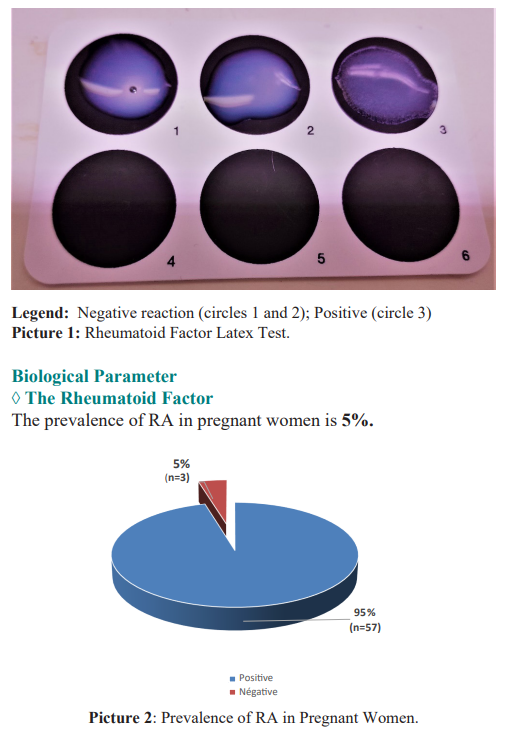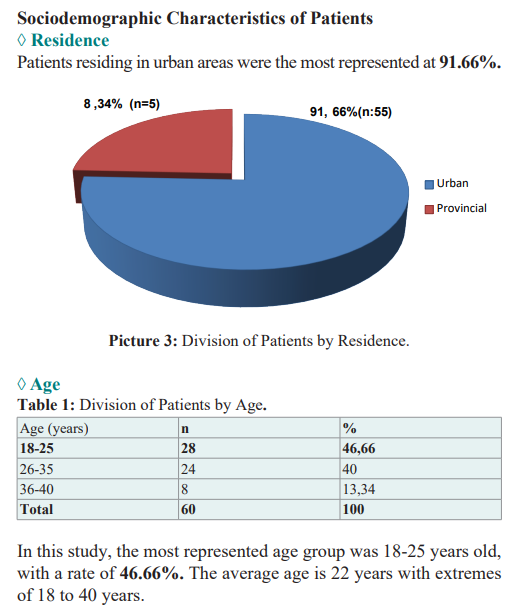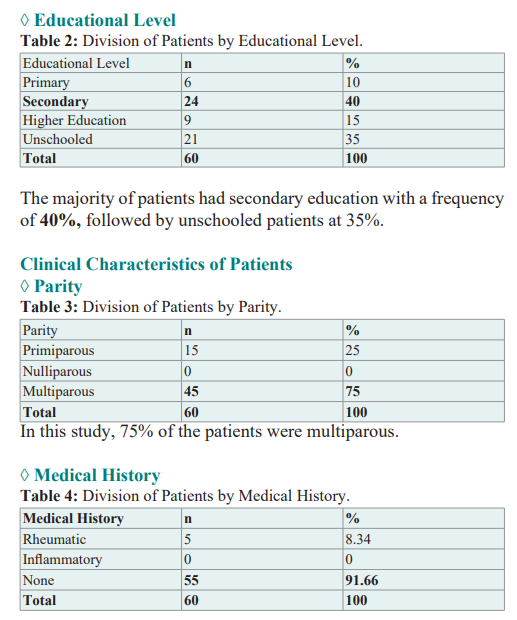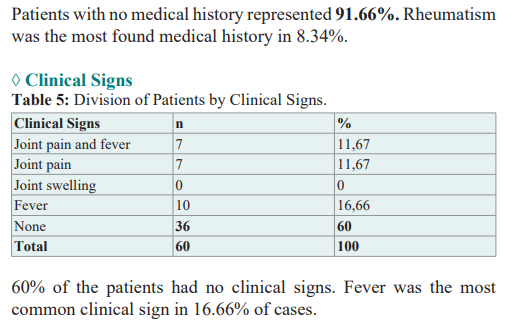Profile of Rheumatoid Factor in Pregnant Women at the University Hospital Center for Mother and Child (Chu-Me)
Author'(s): Tariam Djibangar Agnes, Ahmat Azarak Mahamat*, Ali Mahamat Moussa, Bessimbaye Nadalaou, Mayana Habkreou, Abakar Tadjadine Goudra, Bakaranga-Via Issakou, Mahamat Nadjib and Abdelsalam Tidjani
1 National Reference University Hospital Laboratory (CHURN), Chad.
2 Faculty of Human Health Sciences, University of Ndjamena, Chad.
3 University Center for Mother and Child (CHU-ME), Chad.
*Correspondence:
Tariam Djibangar Agnès, National Reference University Hospital Laboratoire (CHU-RN), Chad.
Received: 04 Jun 2024; Accepted: 20 Jul 2024; Published: 28 Jul 2024
Citation: Agnes TD, Mahamat AA, Moussa AM, et al. Profile of Rheumatoid Factor in Pregnant Women at the University Hospital Center for Mother and Child (Chu-Me). Clin Immunol Res. 2024; 8(2): 1-4.
Abstract
Introduction: Rheumatoid Arthritis (RA) is the most common chronic inflammatory rheumatism, predominantly affecting women. The general objective of our study is to contribute to the management of pregnant women with RA at CHU-ME in N'Djamena. Materials and Methods: This prospective study analyzed the Rheumatoid Factor (Latex Test) in 60 parturients at the prenatal consultation (CPN) of CHU-ME from January 1st to March 31st, 2024. The serological analysis of the RF was determined by an agglutination test on a slide. The variables studied were sociodemographic, clinical, and biological. Results were expressed in average, percentage with standard deviation. Results: Out of 60 samples analyzed, we identified 3 cases of RF positivity in pregnant women showing a rate of 5%. The average age of parturients was 22 years old, ranging from 18 to 40. Most pregnant women had a secondary education level (40%), and 91.66% resided in urban areas. Multiparous women represented 75%, from whom most of them shows no clinical signs (60%) or medical history (91.66%). Conclusion: RF is a preventive factor against the progression to more severe stages of RA, contributing to the reduction of prenatal mortality risks.
Keywords
Introduction
Rheumatoid Arthritis (RA) is a very heterogeneous chronic inflammatory disease and the most common chronic inflammatory rheumatism. It can occur at any age, but it is mostly observed between 40 and 50 years old [1]. It is a systemic chronic autoimmune disease characterized by the inflammation of the synovial joints, leading to joint destruction and deformation. First described by Alfred Baring Garrod in the 1800s [2], RA is a complex multifactorial disease resulting from genetic, environmental, hormonal, and immunological factors [3].
The influence of hormonal status in RA is well established, as evidenced by the predominance of the disease in women (75% of cases). It is therefore not surprising that pregnancy is a risk factor for women with RA [4]. In the past, pregnancy was discouraged in women with RA due to the high risk of maternal and fetal morbidity and mortality [5]. Currently, thanks to advancements in RA management and a better understanding of maternal-fetal risks, pregnancy is largely allowed [5], but provided that it is considered as a "high-risk pregnancy" requiring close collaboration between the patient and healthcare providers to ensure the best possible outcomes.
In Chad, no data on the prevalence of RA in pregnant women were mainly found. That is the reason why we were prompted to conduct this study aiming at contributing to the management of pregnant women with RA.
Materials and Methods
This prospective analytical study was conducted from January 1st to March 31st, 2024, over a period of 3 months. The study was conducted in accordance to ethical principles established by the Ministry of Public Health of Chad for good clinical research practices. It was conducted at the University Center for Mother and Child (CHU-ME) in the prenatal consultation (CPN) service. Patients were recruited based on a pre-established inquiry form containing questionnaires and studied variables, with information collected through interviews. Analyses were performed in the immunology laboratory of the University Center for Mother and Child. Nevertheles the study obtained informed consent from the pregnant women.
Study Population
Our study population consisted of pregnant women attending prenatal consultations. Inclusion criteria were pregnant women with or without RA who agreed to participate to the study. Non- inclusion criteria were non-pregnant women with RA and pregnant women who refused to participate to the study. Variables studied included sociodemographic, clinical, and biological parameters.
Blood Sampling
Blood was drawn by puncturing a peripheral vein into a dry tube.
Methodology
The methodology for performing the tests included three phases:
Pre-analytical Phase
This included all conditions implemented before testing, such as withdrowing blood from patients and sending the samples to the laboratory. Proper procedures included wearing a clean lab coat, washing hands, wearing gloves, cleaning the workspace, identifying and recording tubes in the bench log.
Sample Collection
Blood was collected from the elbow fold (or the back of the hand in case of difficulty). Samples were centrifuged at 3000 RPM for 5 minutes upon arrival at the laboratory.
Analytical phase
This involved performing the Rheumatoid Factor analysis using the agglutination test.
Used Reagents
- Rheumatoid Factors (RF) - Latex Slide Test Ref 31013 lot 42185: a suspension of polystyrene particles coated with gamma globulins.
- Positive RF Control Serum (human origin).
- Negative RF Control Serum (human origin).
- Reusable agglutination slide and single-use pipette.
Storage: Store at 2-8°C, protected from light; do not freeze the Latex Reagent.
Procedure
- Bring each component to room temperature.
- Place one drop of positive control on one circle of the slide and one drop of negative control on another circle.
- Using a provided single-use pipette, place one drop of the specimen on another circle of the test slide.
- Resuspend the Latex reagent by inversion.
- Add one drop of the Latex reagent next to each control and specimen drop.
- Mix the preparation using a single-use pipette over the entire circle surface.
- Gently rock the slide for 2 minutes and observe agglutination in the test circles.
- Finally, clean the slide with demineralized water and air dry.




Ethical Considerations
The inquiry was conducted after obtaining informed and written consent from the patients. Anonymity and confidentiality of the obtained information were guaranteed.
Results
In our study, we recorded 60 pregnant women, with a prevalence rate of 5%. Urban residents constituted the majority, that is to say 91.66%. Women aged 18-25 years years had a representation rate of 46.66%, with an average age of 22 years old, ranging from 18 to 40 years. According to the education level, 40% had secondary education, and multiparous women were the most represented at 75%.
In terms of medical history, 91.66% of the patients had no prior medical history, and fever was the most dominant clinical sign at 60%.
Discussion
Prevalence of Rheumatoid Arthritis
Only RF serology by LATEX test (Biosystems) was our biological parameter. We recorded three (03) positive cases of RF by slide agglutination test, a prevalence rate of 5%, with 95% of cases being RF seronegative. Our results matched the data reported by BERRICHI Celia et al. in Algeria in 2022 [6] and Sabrine S. [1]. With a specificity of 65-85% and sensitivity of 60-80%, RF (Latex Test) [1], RF can be found in other rheumatic or inflammatory diseases, as it is not specific to RA. During pregnancy, there is an increase in the production of gonadal (estrogen and progesterone) and adrenal (cortisol) sex steroids throughout pregnancy [7].
Sociodemographic Characteristics of Patients
In our study, pregnant women aged from 18-25 represented 46.66%, followed by those aged from 26-35 (40%) and 36-40 years old (13.34%). The average age of pregnant women is 22 years, with extremes of 18 and 40 years old. These results show that the most represented age group is young, possibly due to early marriage and the representation of this age group in consultations at CPN. Our results differ from those of LEMHOUER K et al. [8] in Morocco in 2018, who found an age range from 32 to 42 years old with an average age of 37. In our study, the age range varies from 18 to 40 years old, whereas Delphine Jourdan in 2022 in Montpellier, France [9] found an age range from 30-60 years old. We found that 40% of women had a secondary education level. Our result differs from LEMHOUER K et al. [8] in Morocco in 2018, who found that 64% of patients had a secondary education level. This discrepancy may be due to the low school enrollment rate among women in Africa, particularly in Chad, due to cultural factors and some parents' prejudices against girls' education. In our study, 91.66% of the patients resided in urban areas. This can be explained by the lack of RA testing laboratories in rural areas, pushing pregnant women to attend urban centers for testing. Our results differ from those of ASLANOV A.D. in Algeria [10] in 2021, where 60% resided in rural areas.
Clinical Characteristics of Patients
In our study, we found that fever was the most frequent clinical sign in 60% of patients. This result aligns with those of Adamou et al. in Niger [11] in 2019. Fever and arthralgia are the most frequent signs of RA in pregnant women.
Conclusion
Our study, conducted on 60 pregnant women at the University Hospital Center for Mother and Child (CHU-ME) in N'Djamena, aimed at contributing to the management of pregnant women with Rheumatoid Arthritis (RA). RA is the most common chronic inflammatory rheumatism, predominantly affecting women. The prevalence rate in our study was 5%, with 3 positive cases of RF. The average age of pregnant women was 22 years, with most being urban residents and multiparous. Fever was the most frequent clinical sign observed. RF is a preventive factor against progression to more severe stages of RA, contributing to reducing prenatal mortality risks. Further studies with larger sample sizes are recommended to better understand RA in pregnant women in Chad.
Acknowledgements
We would like to thank the University Center for Mother and Child (CHU-ME) for their support and collaboration in this study.
References
- Sabrine SZ. Importance of sero-immunological testing of IgG-IgA rheumatoid factors in the diagnosis of Rheumatoid Arthritis. University of Frères Mentouri Constantine. Faculty of Natural and Life Sciences. 2015; 1-7.
- Abdul Sater AA, Edilova MI, Clouthier DL, et al. The signaling adaptor TRAF1 negatively regulates Toll-like receptor signaling and this underlies its role in rheumatic disease. Nat Immunol. 2017; 18: 26-35.
- Aggarwal RK, Liao K, Nair R, et al. Anticitrullinated peptide antibody assays and their role in the diagnosis of rheumatoid arthritis. Arthritis Rheum. 2009; 61: 1472-1483.
- François PILLONa, Yves MICHIELSb. Epidemiology and pathophysiology of rheumatoid arthritis. Actualités pharmaceutiques, Supplement training at n° 531, 4th quarter.
- CRAT Centre de Référence sur les Agents Tératogènes. Nonsteroidal anti-inflammatory drugs and pregnancy. 2020.
- Mlles Berrichi C, Ait DT, Aksoum T. Retrospective study and evaluation of the correlation between anti-CCP and RF autoantibodies with the severity of Rheumatoid Arthritis. [Master’s Thesis]; University Mouloud Mammeri Tizi-Ouzou, Faculty of Biological Sciences and Agronomic Sciences. Department of Biochemistry and Microbiology. 2022; 33-88.
- Laurent Mandelbrot - Department of Gynecology-Obstetrics, Louis Mourier Hospital, France. Maternal Inflammation And Fetal-Neonatal Consequences. MAPAR 2019. :12.
- Lemhouer K. Rheumatoid Arthritis And Pregnancy: Experience from the Gynecology-Obstetrics Department of the Military Hospital Moulay Ismaïl of Meknes (about 25 cases). [Medical Thesis]. University Sidi Mohamed Ben Abdallah. Faculty of Medicine and Pharmacy. 2018.
- DELPHINE Jourdan. Rheumatoid Arthritis: study of evolution and drug therapies in pregnant women. [Pharmacy Thesis], University Of Montpellier, Faculty of Pharmacy – 15 Avenue Charles Flahault. 2022.
- Silman AJ, MacGregor AJ, Thomson W, et al. Twin concordance rates for rheumatoid arthritis: results from a nationwide study. Br J Rheumatol. 2006; 32: 903-907.
- Andrianakos A, Trontzas P, Christoyannis F, et al. ESORDIG Study Group. Prevalence and management of rheumatoid arthritis in the general population of Greece--the ESORDIG study. Rheumatology (Oxford). 2009; 45: 1549-1554.
- Émeline Minichiello, Luca Semerano, Marie-Christophe Boissier. Evolution over time of rheumatoid arthritis: incidence, prevalence, severity. Systematic review of the literature. Revue du Rhumatisme. 2017; 84: 9-16.